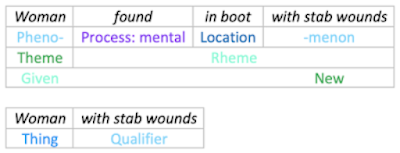Fawcett (2010: 335-6):
The fourth type of evidence is that the 'full' version of the 'verbal group' (i.e., the version that includes the Finite) is so liable to interruption by other clause elements (the Subject, Complements and Adjuncts) that its status as a grammatical unit should be questioned on these grounds alone. Alternatively, if we interpret the 'verbal group' as consisting of what remains when the Finite and the Main Verb Extension are treated as elements of the clause, there is so little left that we might as well promote these elements to the clause as well (and so avoid the various problems with the 'verbal group' that the paper describes).
Blogger Comments:
[1] To be clear, this is no evidence against the verbal group. On the one hand, contrary to SFL Theory, it gives priority to the view 'from below': structural realisation instead of the meaning that is expressed. On the other hand, discontinuity of structure is textually motivated, and applies equally to nominal groups serving participant roles, as demonstrated by:
discontinuous Phenomenon
discontinuous Carrier
discontinuous Attribute
[2] To be clear, this is merely another restatement of Fawcett's first type of evidence (p335):
The first reason is that, if the Finite is to be promoted to function as an element of the clause, the other 'major' elements of the 'verbal group' must be promoted too.




No comments:
Post a Comment